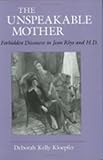The Unspeakable Mother : Forbidden Discourse in Jean Rhys and H.D. / Deborah Kelly Kloepfer.
Material type: TextSeries: Reading Women WritingPublisher: Ithaca, NY : Cornell University Press, [2018]Copyright date: ©1989Description: 1 online resource (224 p.)Content type:
TextSeries: Reading Women WritingPublisher: Ithaca, NY : Cornell University Press, [2018]Copyright date: ©1989Description: 1 online resource (224 p.)Content type: - 9781501722035
- Autobiographical fiction, English -- History and criticism
- Feminism and literature -- English-speaking countries -- History -- 20th century
- Mothers and daughters in literature
- Women and literature -- English-speaking countries -- History -- 20th century
- Family & Relationships
- Literary Studies
- Womens Studies
- LITERARY CRITICISM / Subjects & Themes / Women
- 820.9/355 22
- PR6035.H96 Z76 1989eb
- online - DeGruyter
| Item type | Current library | Call number | URL | Status | Notes | Barcode | |
|---|---|---|---|---|---|---|---|
 eBook
eBook
|
Biblioteca "Angelicum" Pont. Univ. S.Tommaso d'Aquino Nuvola online | online - DeGruyter (Browse shelf(Opens below)) | Online access | Not for loan (Accesso limitato) | Accesso per gli utenti autorizzati / Access for authorized users | (dgr)9781501722035 |
Frontmatter -- Contents -- Foreword -- Acknowledgments -- Prologue -- 1. The Blind Spot -- 2. Gazing for His Behalf -- 3. Orestes' Sisters -- 4. Between Corpse and Song -- 5. Words That Are Not Words -- 6. Fishing the Murex Up -- 7. Bitter Jewel -- 8. The Syntax of Stained Glass -- 9. She Herself Is the Riddling -- Epilogue -- Bibliography -- Index -- Library of Congress Cataloging-in-Publication Data
restricted access online access with authorization star
http://purl.org/coar/access_right/c_16ec
Moving back and forth between experience and language, The Unspeakable Mother operates out of the intersection of two perspectives: women's immersion in the mother/daughter dyad and the paradoxical absence of the mother in the daughter's discourse. Deborah Kelly Kloepfer calls attention to the repeated allusions to dead mothers, dying mothers, mad mothers, stepmothers, abortions, stillbirths, miscarriages, and infant death in the novels of Jean Rhys and the poems and prose of H.D. Drawing on American and French feminist theory, she suggests that Rhys, H.D., and other modernist women writers, rather than just characterizing women's experience, are encoding the mother in relation to language. The dead mother is a trope for textlessness, a trope that also serves to inscribe the repression of the female speaking/writing subject.Challenging a number of assumptions of critical discourse, in which the father traditionally functions as the guardian of the symbolic, Kloepfer shows how thematic violence toward the female body is accompanied by the rupturing of conventional language, an act that both reconstitutes the abandoned mother and turns the violence against the androcentric discourse that has denied her. In the work of both Rhys and H.D., Kloepfer uncovers a startling and unsettling incestuous language between mother and daughter which relies not only on the unspoken but on the unspeakable.Anyone interested in literary modernism will find The Unspeakable Mother fascinating reading, as will students and scholars in the fields of psychoanalytic criticism and feminist theory.
Mode of access: Internet via World Wide Web.
In English.
Description based on online resource; title from PDF title page (publisher's Web site, viewed 26. Apr 2024)


